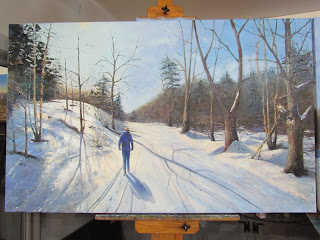For the last two days, I worked on the Newfane, VT town common painting. If you have read the prior posts on this project, you know that I have two large canvases in my studio side by side. They are becoming what I hope will be a compatible pair of winterscapes. One painting has morning sun and one features late afternoon sun.
In my last post I described the one on the left which is me hiking up Mount Putney in Vermont on a beautiful January morning a couple of years ago. I noted that the color temperature scheme was warm light, cool shadows. This post is about its companion painting, Newfane, VT town common.

The painting on the right is late afternoon, and the color temperature scheme is cool light, and warm, blue shadows. Information on the topic of color temperature is not plentiful on the web. I have not been able to find enough reference information from experienced artists about this scheme, so I am forced to trust my own eyes. I know many of us in New England are almost giddy about the fact that we have escaped winter's fury this year, however, I need some snow to verify my color scheme! I suppose I could load the 30x48 inch canvas into my backseat and start driving north until I see some snow. I'd rather take a chance and wait around here to see what Mother Nature can do. She never usually fails to send a mighty Nor'easter at some point during our winters.
Putting the snow issues aside, I added the Newfane Common trees this week. I had already had added the shadows of the trees early in the painting without the actual trees. I think this was a mistake. I have been struggling to retain these disconcerting shadows in the common snow for some strange reason. I typically rough in shadows early, but in the case of this painting and the delayed addition of the trees, it has not been a good idea.

Adding the trees took some courage because it meant painting over the finished sky with bold, dark branches. I began with the tree that splits the sun in half. I saw that the sun is so bright that it washes out the branches that pass right in front of it, so I painted it that way. This sunny tree is the furthest tree from me on the common, so I use very little color and basically trace in the varied branches. The next closest tree is the one on the sunny tree's left. I warm up my tree bark color slightly. I continued working each tree moving left, adding more and more burnt sienna and more contrast. The closest tree on the left foreground is darker and more colorful. Additionally, I added the blue light cast up onto the shadowed side of this foreground tree. I went back to the sunny tree and applied highlights that depict how the sun is lighting up selected branches.
The next phase will be to repaint the shadows for the trees. I've been working on my two winterscapes for three weeks, and it seems much longer. My goal is to complete both to an acceptable level by the end of this week. I will then put them out of sight until I see real snow. The question is, will the sight of real snow be this winter or next?












